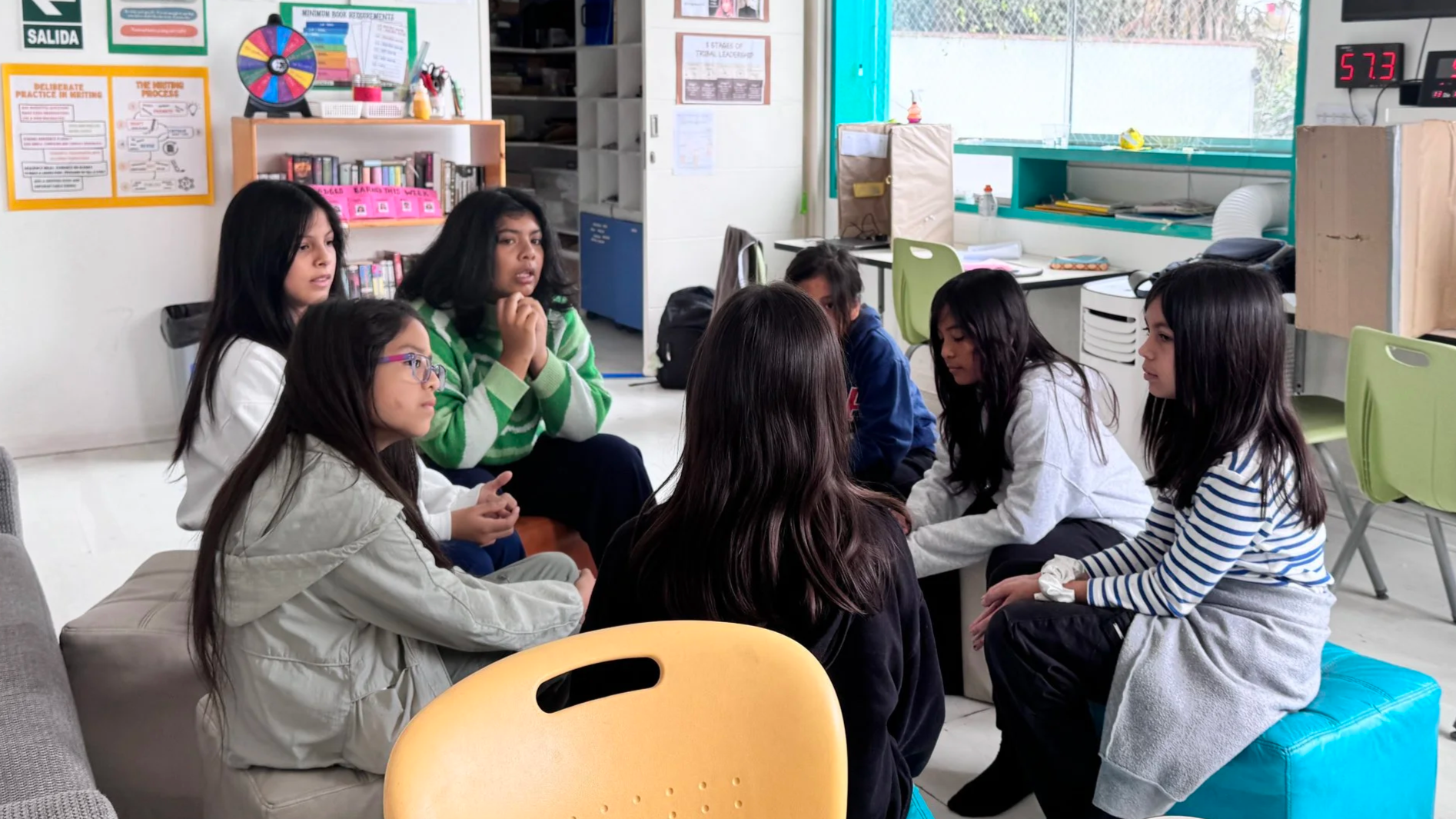By Ines Kudo
One afternoon during flow time, Giulia, Maitane, Sofía and Leyla, the girls from Ascend (middle school) came into the studio, talking with concern. They had seen a younger girl in Discovery (elementary) trip another, who almost fell. It wasn’t the first time, they said. They had also seen her hair being pulled and heard teasing. And the girl took it as a joke, but laugh uncomfortably. “It didn’t sound real,” they noted. “She looked uneasy, like she didn’t know how to set limits.”
Unsure of what to do, they wondered whether to report it to the Discovery Council, made up of three students. I asked them what they thought would help the younger girls most: if they talked to them directly or bring the issue to the Council. They chose to call a peace table.
At first, the conversation was hesitant. The older girls explained what they’d seen and reminded them what bullying means: repeated, unequal, intentional harm. Gradually, the younger ones began to open up.
“I think it started in taekwondo.”
“Sometimes I go too far.”
“I’ve said things too.”
“I ask for forgiveness.”
When Maitane asked why they don't stop this dynamic, one said, “Right when I’m going to set limits, I remember the good things, the friendship, and forget the bad.”
“So you fear losing their friendship?” Leyla asked. The girls nodded.
Sensing their discomfort, the Ascend girls shared their own stories. “Last year I had that dynamic, jokes that escalated until they stopped being fun.” Another said, “When I was your age, I hurt and was hurt by friends too. It doesn’t work, but friendships can heal.”
Giulia asked, “Do you think silence helps or would it be better to talk?” One younger girl reflected, “Pauses calm us down, but I think it’s better to talk about what bothers us instead of pretending nothing happened.”
Sofía added, “There’s a big difference between something being fun and something not bothering you.”
Giulia agreed: “Sometimes we laugh just to fit in.” “Maybe my laugh was contagious,” one admitted, “but it wasn’t because it was fun.”
By the end, the younger girls named what they wanted:
“To stop being afraid of showing what we think.”
“To rebuild our friendship and leave hostility behind.”
They agreed to create a contract together.
I watched the older girls care and lead. They didn’t gossip or punish; they guided and took action. Their empathy moved me deeply. And the younger ones, faced a scary moment with courage, took responsibility and chose honesty. It was a moment of real mentorship, for life.
Later, the Discovery Council met with them to discuss consequences. Maitane, one of the Ascend girls, facilitated the conversation. They debated whether the behavior merited alerts for bullying. They decided to recommend an Orange Alert (two alerts) for each of the three girls. And so I met with the girls and the Council to hear them out. Truth be told, I wasn't sure it warranted any alerts, but I needed to understand their views.
Through socratic questions and honest answers, a pattern became clear: when one girl got upset, she told the third to stop talking to the other. The third, afraid of upseting her friend, complied. “Sometimes I forget we’re not talking to her,” she confessed, “and you remind me. I’m not saying you make me do it…” Yet, she fully acknowledge her responsibility: “You didn't force me, it was my decision.”
They called it a “pause,” but admitted they never said so directly. They had learned this from older girls years ago, when they were the ones being ignored. When I asked how this made them feel, they said “sad.” So they admitted when they applied the silent treatment, they knew it would hurt, they sometimes even felt sorry for their friend feeling alone.
Step by step, they realized the pattern: it was systematic (many times), intentional (meant to hurt or punish), and involved power imbalance (2 to 1), the very definition of bullying. Still, they wanted to repair it. The Council chose to issue two alerts but also recognized something important: no adult had ever told them that “silent treatment” counted as harm. It was the older girls who noticed, cared, and acted.
It struck me how often adults act the same way, choosing silence, sighs, sarcasm instead of truth. We withdraw affection or hide our feelings, hoping others will notice, saying “No, nothing” when something clearly hurts. These are the same dynamics the girls were naming. So we agreed on a Yellow Alert (1) for the two girls systematically ignoring the third one. None for her.
What mattered most wasn’t the alert, but the insight they reached: no one deserves the silent treatment. They don’t have to take it. They deserve better.
Change is possible. If these girls can learn so young to face conflict with honesty, to set boundaries, to not tolerate disrespect and unkindness, and to repair relationships, then they truly have the power to change the world.

